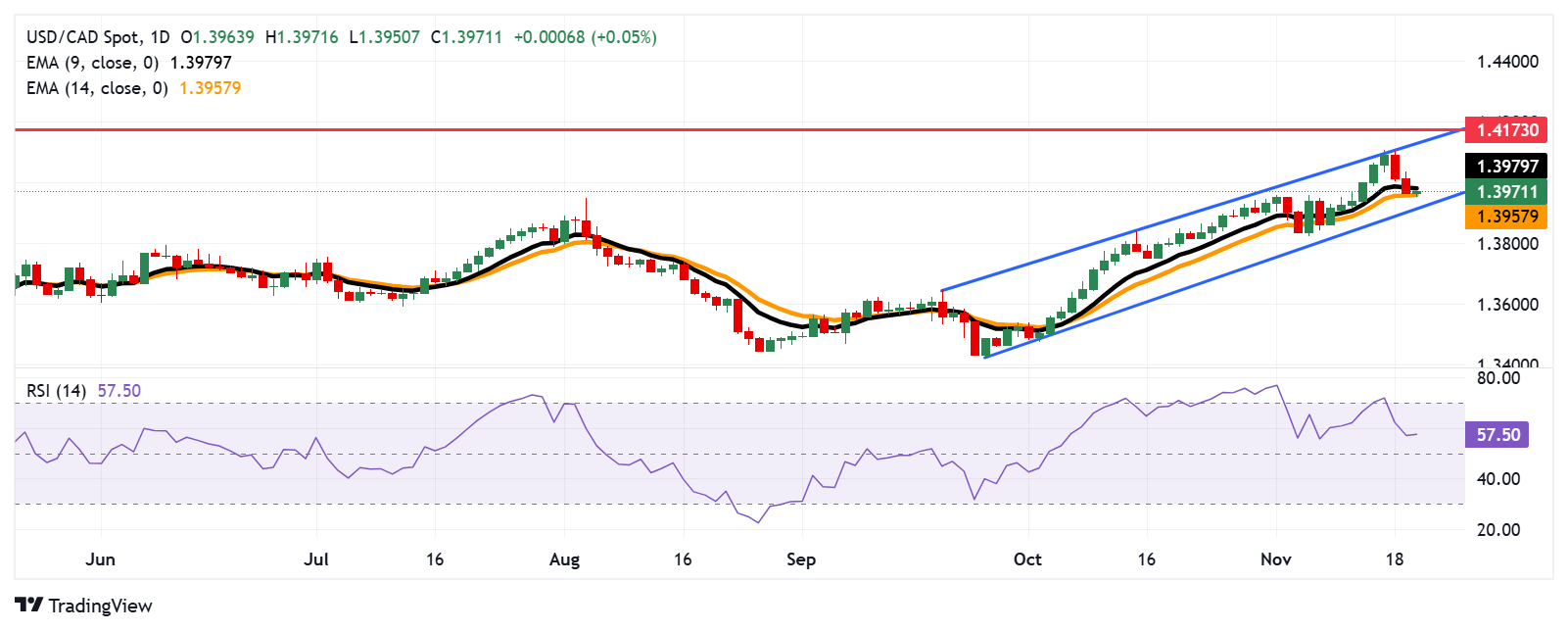USD/CAD Price Forecast: Finds initial support at 14-day EMA near 1.3950
- The USD/CAD faces an immediate barrier at the nine-day EMA of 1.3979 level.
- The nine-day EMA is above the 14-day EMA, signifying ongoing strength in short-term price momentum.
- The pair finds support around the 14-day EMA at the 1.3958 level, followed by the psychological 1.3950 level.
The USD/CAD pair holds ground after two days of losses, trading around 1.3970 during the European hours on Wednesday. The daily chart analysis indicates that the pair is trending upwards within an ascending channel pattern, suggesting a bullish bias.
The 14-day Relative Strength Index (RSI) is above the 50 level, confirming continued bullish momentum. Additionally, the nine-day Exponential Moving Average (EMA) is positioned above the 14-day EMA, indicating persistent strength in short-term price momentum.
On the upside, the USD/CAD pair faces an immediate resistance at the nine-day EMA of 1.3979 level. If the pair breaks above this level, it may move toward the region around the upper boundary of the ascending channel at the 1.4130 level. A breakout above this channel could reinforce the bullish bias and drive the pair toward the next key resistance level of 1.4173, last seen in May 2020.
Regarding support, the USD/CAD pair could test the immediate 14-day EMA at the 1.3958 level. A break below this level could weaken the bullish bias, putting downward pressure on the pair to test the lower boundary of the ascending channel at the 1.3920 level.
USD/CAD: Daily Chart

Canadian Dollar PRICE Today
The table below shows the percentage change of Canadian Dollar (CAD) against listed major currencies today. Canadian Dollar was the weakest against the British Pound.
| USD | EUR | GBP | JPY | CAD | AUD | NZD | CHF | |
|---|---|---|---|---|---|---|---|---|
| USD | 0.27% | -0.02% | 0.65% | 0.04% | 0.22% | 0.35% | 0.25% | |
| EUR | -0.27% | -0.29% | 0.36% | -0.23% | -0.05% | 0.08% | -0.02% | |
| GBP | 0.02% | 0.29% | 0.65% | 0.06% | 0.24% | 0.36% | 0.27% | |
| JPY | -0.65% | -0.36% | -0.65% | -0.60% | -0.42% | -0.31% | -0.39% | |
| CAD | -0.04% | 0.23% | -0.06% | 0.60% | 0.18% | 0.31% | 0.22% | |
| AUD | -0.22% | 0.05% | -0.24% | 0.42% | -0.18% | 0.13% | 0.05% | |
| NZD | -0.35% | -0.08% | -0.36% | 0.31% | -0.31% | -0.13% | -0.10% | |
| CHF | -0.25% | 0.02% | -0.27% | 0.39% | -0.22% | -0.05% | 0.10% |
The heat map shows percentage changes of major currencies against each other. The base currency is picked from the left column, while the quote currency is picked from the top row. For example, if you pick the Canadian Dollar from the left column and move along the horizontal line to the US Dollar, the percentage change displayed in the box will represent CAD (base)/USD (quote).

